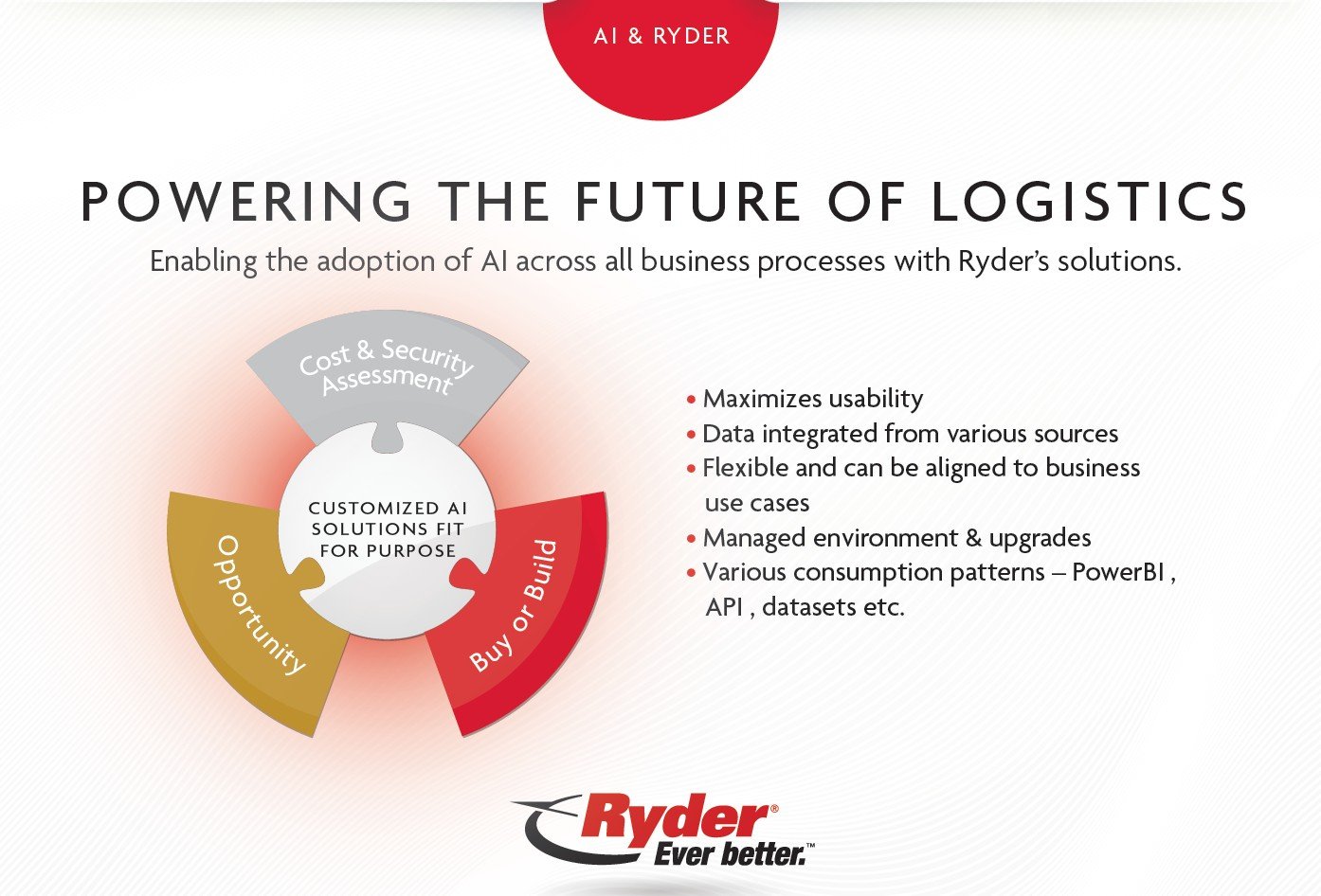Semi Trucks
Logistics
Lease & Maintenance
Buy Used Trucks

The digital revolution has fundamentally altered the retail landscape, with omnichannel fulfillment emerging as a dominant force. This shift has been driven by consumers' increasing preference for the convenience and variety offered by online shopping.
However, this rapid growth has brought with it a host of logistics challenges. Traditional supply chain models, which were once sufficient, are struggling to keep up with the demands of modern consumers who expect rapid delivery and seamless service.
In response to these challenges, AI-driven supply chain automation has emerged as a powerful solution, offering the potential to revolutionize logistics by enhancing efficiency, accuracy, and scalability. Ryder, a leader in transportation logistics and supply chain solutions, is at the forefront of this transformation.
By integrating AI into its operations, Ryder is setting new standards in AI inventory forecasting, warehouse efficiency, transportation networks, and automated order fulfillment.
That’s why, in this article, we’ll examine how our innovative application of AI is enabling businesses to scale seamlessly in the competitive e-commerce landscape.
The surge in online shopping has been nothing short of explosive.
According to eMarketer, global e-commerce sales are projected to grow 6.8%, as more than 21.1% of retail sales happen online.
This growth is driven by consumers' increasing preference for the convenience of online shopping, coupled with their rising expectations for fast and reliable delivery services.
Key challenges include:
Traditional logistics models, which often rely on manual processes and static systems, are ill-equipped to handle these demands.
This creates a pressing need for smarter, more adaptive AI in logistics solutions that dynamically respond to changing conditions and consumer demands.
AI in logistics is transformative by enabling data-driven decision-making, real-time optimization, and predictive analytics.
Unlike traditional systems, which follows predefined rules, AI systems learn from data, adapt to new information, and make complex decisions autonomously. This capability is particularly valuable in logistics, where conditions can change rapidly and unpredictably.
AI enhances logistics operations by analyzing vast amounts of data to identify patterns and trends, enabling more accurate demand forecasting and inventory management. AI also optimizes routing and delivery schedules, reducing transit times and costs.
Furthermore, AI-powered systems can predict potential disruptions and proactively adjust operations to mitigate their impact, ensuring a smoother supply chain.
Per MIT’s Sloan School of Management:

Ryder harnesses the power of AI to enhance logistics, from inventory forecasting to warehouse optimization and accelerated order fulfillment.
By leveraging AI, Ryder enables businesses to predict demand with precision, optimize warehouse operations, and ensure timely delivery, all while maintaining cost efficiency.
This comprehensive suite of AI-driven solutions not only helps companies manage their current operations more effectively but also provides the scalability needed for future growth.
By partnering with Ryder, businesses can achieve significant improvements in operational efficiency, customer satisfaction, and market competitiveness.

By analyzing historical sales data, market trends, and external factors such as weather and economic conditions, our AI systems can accurately predict demand.
This capability enables businesses to maintain optimal inventory levels, thereby reducing the risk of stockouts and overstocking situations.
According to McKinsey, for distributors, AI creates significant value, reducing inventory by 20% to 30%, along with other benefits.
Warehouse operations are a critical component of the supply chain, and AI is playing a pivotal role in optimizing these processes. Ryder uses AI to enhance warehouse layout design, develop efficient picking strategies, and integrate robotics for improved productivity.
AI systems analyze data in real-time to anticipate changes and make dynamic adjustments to inbound and outbound logistics, ensuring that warehouses operate at peak efficiency.
For instance, AI can determine the most efficient placement of products within a warehouse, minimizing the distance workers need to travel to pick items.
This optimization enhances throughput, reduces labor costs, and accelerates processing times, enabling businesses to handle larger volumes of orders without compromising speed or accuracy.
In the age of e-commerce fulfillment, meeting same-day and next-day delivery expectations is crucial for maintaining a competitive edge.
Our automated order fulfillment employs AI-powered solutions to optimize routing, carrier selection, and last-mile delivery.
By analyzing factors such as traffic patterns, weather conditions, and delivery windows, AI systems can identify the most efficient routes and carriers, minimizing delays and costs.
Moreover, AI proactively identifies potential fulfillment delays and takes corrective actions to ensure timely delivery.
This capability is particularly valuable during peak shopping seasons, when order volumes surge and the risk of delays increases.
By leveraging AI, Ryder helps businesses meet customer expectations for fast and reliable delivery, enhancing their competitive position in the market.
One of the most significant advantages of AI-driven logistics is the ability to scale operations without proportionally increasing costs.
Our platform approach offers flexibility for retailers of all sizes, allowing them to expand their operations seamlessly.
By automating key processes and optimizing resource allocation, businesses can grow their e-commerce capabilities while maintaining control over expenses.
Our AI solutions enable businesses to handle increased order volumes without requiring substantial investments in additional infrastructure or labor.
This scalability is crucial for e-commerce companies looking to capitalize on market opportunities and expand their reach.
AI-enabled logistics provide a competitive edge for businesses of all sizes whether it is e-commerce or omnichannel fulfillment, allowing them to meet customer expectations and drive growth.
When choosing a third-party logistics (3PL) partner, key considerations include the provider's technological capabilities, scalability, and track record of success. Ryder stands out as a future-forward logistics provider, offering cutting-edge AI solutions that empower businesses to thrive in a rapidly evolving market.
By partnering with Ryder, companies can leverage AI to enhance their supply chain operations and deliver exceptional customer experiences.
The integration of AI into logistics processes not only enhances efficiency and accuracy but also enables businesses to respond promptly to market changes and evolving consumer demands. This agility is essential for maintaining a competitive edge and achieving long-term success.
The role of AI in logistics will only become more critical. Businesses that embrace AI-driven solutions will be well-positioned to meet the demands of the modern consumer and achieve sustainable growth.
AI is not just a tool for improving logistics operations. It is a strategic enabler that allows businesses to scale efficiently, reduce costs, and enhance customer satisfaction.
Our commitment to leveraging AI technology positions us as a leader in the logistics industry, offering businesses the tools they need to succeed in the competitive e-commerce landscape.
For businesses that want to optimize their supply chain operations and gain a competitive edge, exploring our AI capabilities is a valuable step.
To learn more about how Ryder can help your business thrive, contact us for a consultation today.